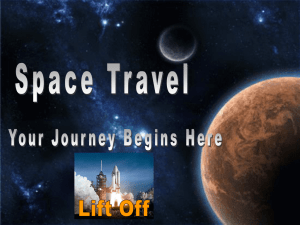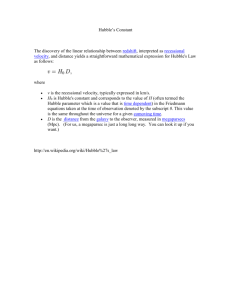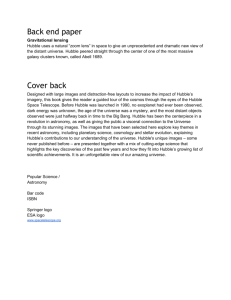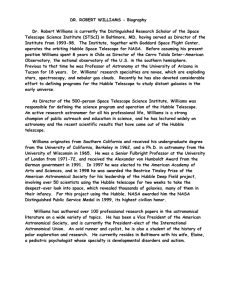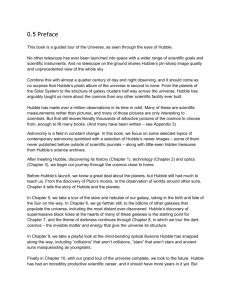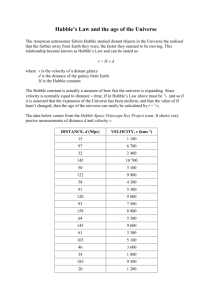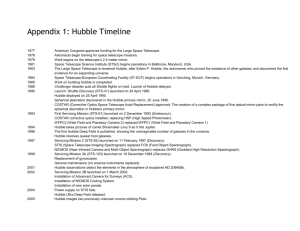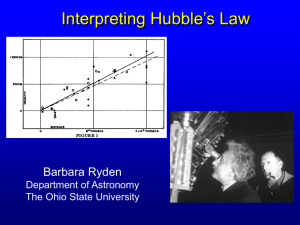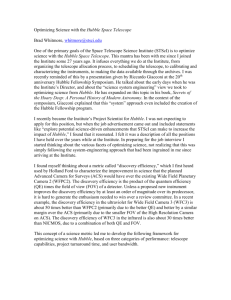The Future of the Hubble Space Telescope
advertisement
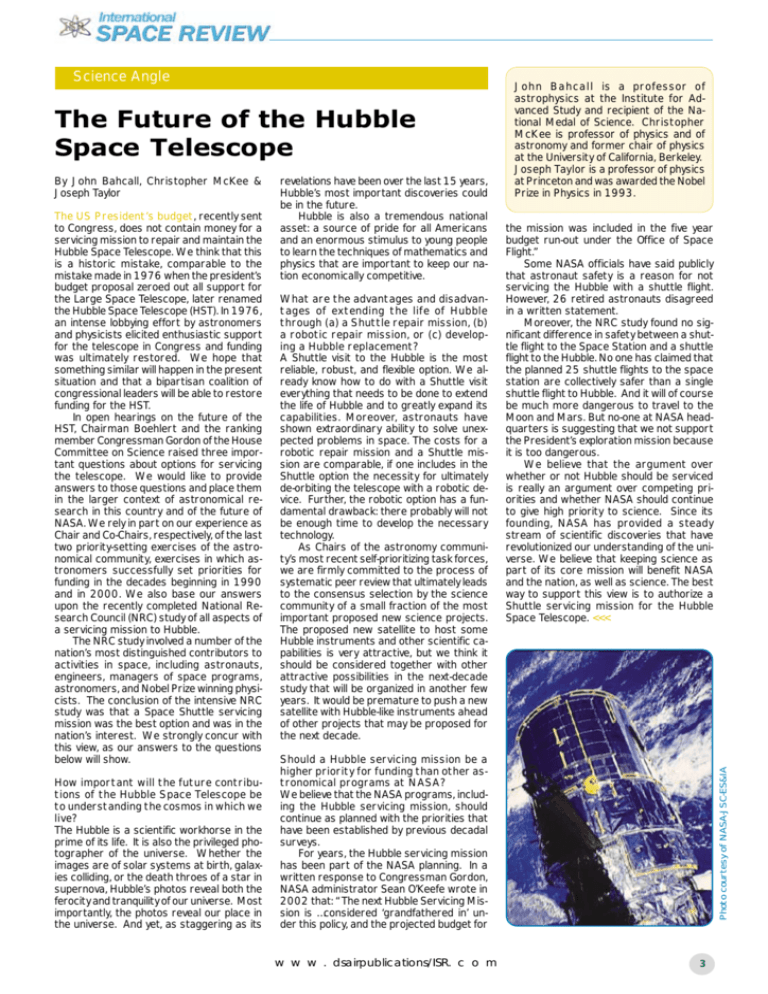
Science Angle The Future of the Hubble Space Telescope The US President’s budget, recently sent to Congress, does not contain money for a servicing mission to repair and maintain the Hubble Space Telescope. We think that this is a historic mistake, comparable to the mistake made in 1976 when the president’s budget proposal zeroed out all support for the Large Space Telescope, later renamed the Hubble Space Telescope (HST). In 1976, an intense lobbying effort by astronomers and physicists elicited enthusiastic support for the telescope in Congress and funding was ultimately restored. We hope that something similar will happen in the present situation and that a bipartisan coalition of congressional leaders will be able to restore funding for the HST. In open hearings on the future of the HST, Chairman Boehlert and the ranking member Congressman Gordon of the House Committee on Science raised three important questions about options for servicing the telescope. We would like to provide answers to those questions and place them in the larger context of astronomical research in this country and of the future of NASA. We rely in part on our experience as Chair and Co-Chairs, respectively, of the last two priority-setting exercises of the astronomical community, exercises in which astronomers successfully set priorities for funding in the decades beginning in 1990 and in 2000. We also base our answers upon the recently completed National Research Council (NRC) study of all aspects of a servicing mission to Hubble. The NRC study involved a number of the nation’s most distinguished contributors to activities in space, including astronauts, engineers, managers of space programs, astronomers, and Nobel Prize winning physicists. The conclusion of the intensive NRC study was that a Space Shuttle servicing mission was the best option and was in the nation’s interest. We strongly concur with this view, as our answers to the questions below will show. How important will the future contributions of the Hubble Space Telescope be to understanding the cosmos in which we live? The Hubble is a scientific workhorse in the prime of its life. It is also the privileged photographer of the universe. Whether the images are of solar systems at birth, galaxies colliding, or the death throes of a star in supernova, Hubble’s photos reveal both the ferocity and tranquility of our universe. Most importantly, the photos reveal our place in the universe. And yet, as staggering as its revelations have been over the last 15 years, Hubble’s most important discoveries could be in the future. Hubble is also a tremendous national asset: a source of pride for all Americans and an enormous stimulus to young people to learn the techniques of mathematics and physics that are important to keep our nation economically competitive. What are the advantages and disadvantages of extending the life of Hubble through (a) a Shuttle repair mission, (b) a robotic repair mission, or (c) developing a Hubble replacement? A Shuttle visit to the Hubble is the most reliable, robust, and flexible option. We already know how to do with a Shuttle visit everything that needs to be done to extend the life of Hubble and to greatly expand its capabilities. Moreover, astronauts have shown extraordinary ability to solve unexpected problems in space. The costs for a robotic repair mission and a Shuttle mission are comparable, if one includes in the Shuttle option the necessity for ultimately de-orbiting the telescope with a robotic device. Further, the robotic option has a fundamental drawback: there probably will not be enough time to develop the necessary technology. As Chairs of the astronomy community’s most recent self-prioritizing task forces, we are firmly committed to the process of systematic peer review that ultimately leads to the consensus selection by the science community of a small fraction of the most important proposed new science projects. The proposed new satellite to host some Hubble instruments and other scientific capabilities is very attractive, but we think it should be considered together with other attractive possibilities in the next-decade study that will be organized in another few years. It would be premature to push a new satellite with Hubble-like instruments ahead of other projects that may be proposed for the next decade. the mission was included in the five year budget run-out under the Office of Space Flight.” Some NASA officials have said publicly that astronaut safety is a reason for not servicing the Hubble with a shuttle flight. However, 26 retired astronauts disagreed in a written statement. Moreover, the NRC study found no significant difference in safety between a shuttle flight to the Space Station and a shuttle flight to the Hubble. No one has claimed that the planned 25 shuttle flights to the space station are collectively safer than a single shuttle flight to Hubble. And it will of course be much more dangerous to travel to the Moon and Mars. But no-one at NASA headquarters is suggesting that we not support the President’s exploration mission because it is too dangerous. We believe that the argument over whether or not Hubble should be serviced is really an argument over competing priorities and whether NASA should continue to give high priority to science. Since its founding, NASA has provided a steady stream of scientific discoveries that have revolutionized our understanding of the universe. We believe that keeping science as part of its core mission will benefit NASA and the nation, as well as science. The best way to support this view is to authorize a Shuttle servicing mission for the Hubble Space Telescope. <<< Should a Hubble servicing mission be a higher priority for funding than other astronomical programs at NASA? We believe that the NASA programs, including the Hubble servicing mission, should continue as planned with the priorities that have been established by previous decadal surveys. For years, the Hubble servicing mission has been part of the NASA planning. In a written response to Congressman Gordon, NASA administrator Sean O’Keefe wrote in 2002 that: “ The next Hubble Servicing Mission is …considered ‘grandfathered in’ under this policy, and the projected budget for w w w . dsairpublications/ISR. c o m Photo courtesy of NASA-JSC-ES&IA By John Bahcall, Christopher McKee & Joseph Taylor John Bahcall is a professor of astrophysics at the Institute for Advanced Study and recipient of the National Medal of Science. Christopher McKee is professor of physics and of astronomy and former chair of physics at the University of California, Berkeley. Joseph Taylor is a professor of physics at Princeton and was awarded the Nobel Prize in Physics in 1993. 3
